ACCT 5015 Report: Analyzing the Tesco Accounting Scandal of 2014
VerifiedAdded on 2023/06/12
|18
|4455
|465
Report
AI Summary
This report provides an in-depth analysis of the Tesco accounting scandal of 2014, detailing the events, consequences, and ethical issues involved. It identifies key stakeholders affected by the scandal, including employees, shareholders, customers, and suppliers, and examines the ethical breaches committed by Tesco executives. The report applies Stakeholder Theory and Legitimacy Theory to explain the underlying causes and implications of the scandal. Furthermore, it discusses possible solutions and lessons learned from the Tesco case, emphasizing the importance of ethical conduct and compliance with accounting standards. The report concludes with recommendations to prevent similar scandals in the future. Desklib offers a wealth of resources, including past papers and solved assignments, to aid students in their studies.
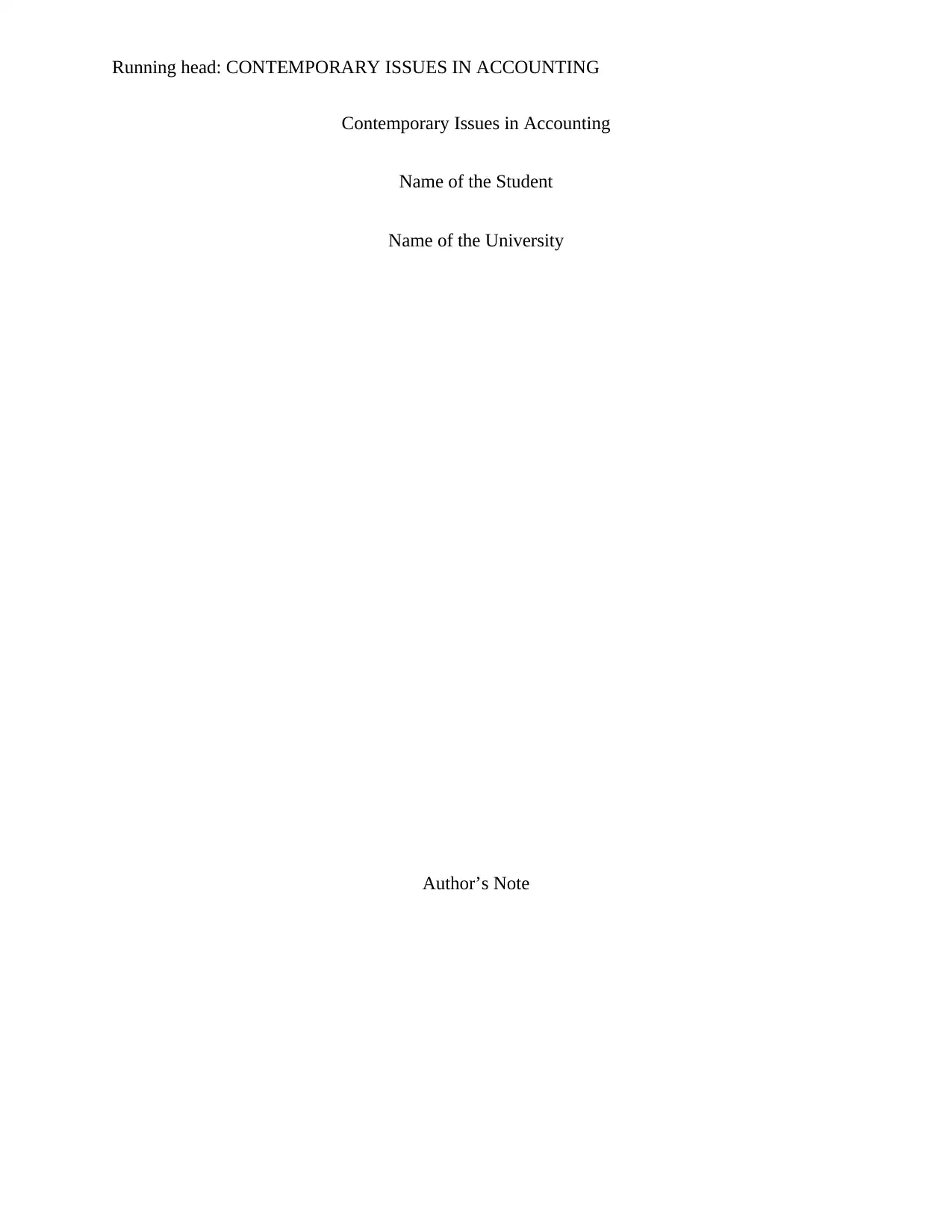
Running head: CONTEMPORARY ISSUES IN ACCOUNTING
Contemporary Issues in Accounting
Name of the Student
Name of the University
Author’s Note
Contemporary Issues in Accounting
Name of the Student
Name of the University
Author’s Note
Paraphrase This Document
Need a fresh take? Get an instant paraphrase of this document with our AI Paraphraser
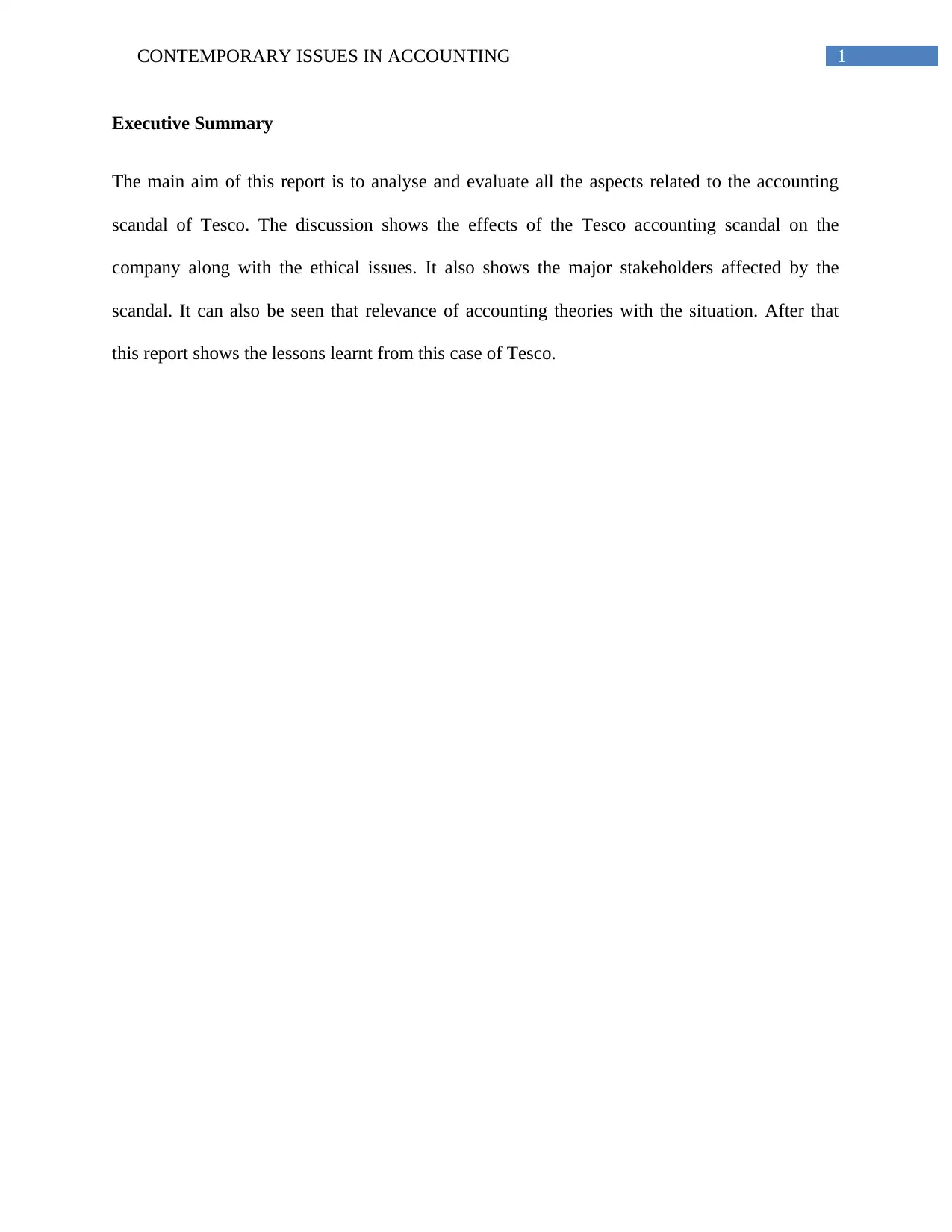
1CONTEMPORARY ISSUES IN ACCOUNTING
Executive Summary
The main aim of this report is to analyse and evaluate all the aspects related to the accounting
scandal of Tesco. The discussion shows the effects of the Tesco accounting scandal on the
company along with the ethical issues. It also shows the major stakeholders affected by the
scandal. It can also be seen that relevance of accounting theories with the situation. After that
this report shows the lessons learnt from this case of Tesco.
Executive Summary
The main aim of this report is to analyse and evaluate all the aspects related to the accounting
scandal of Tesco. The discussion shows the effects of the Tesco accounting scandal on the
company along with the ethical issues. It also shows the major stakeholders affected by the
scandal. It can also be seen that relevance of accounting theories with the situation. After that
this report shows the lessons learnt from this case of Tesco.
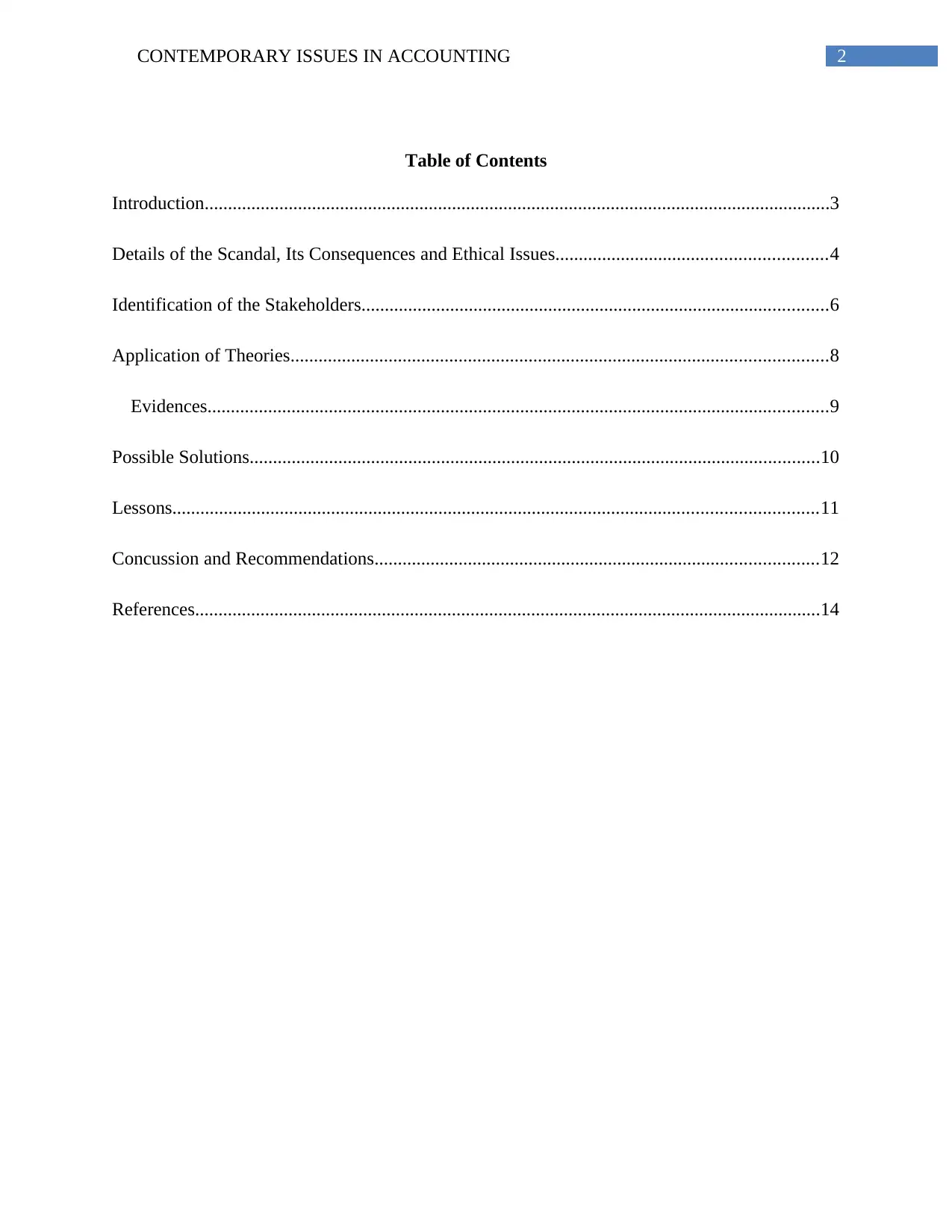
2CONTEMPORARY ISSUES IN ACCOUNTING
Table of Contents
Introduction......................................................................................................................................3
Details of the Scandal, Its Consequences and Ethical Issues..........................................................4
Identification of the Stakeholders....................................................................................................6
Application of Theories...................................................................................................................8
Evidences.....................................................................................................................................9
Possible Solutions..........................................................................................................................10
Lessons..........................................................................................................................................11
Concussion and Recommendations...............................................................................................12
References......................................................................................................................................14
Table of Contents
Introduction......................................................................................................................................3
Details of the Scandal, Its Consequences and Ethical Issues..........................................................4
Identification of the Stakeholders....................................................................................................6
Application of Theories...................................................................................................................8
Evidences.....................................................................................................................................9
Possible Solutions..........................................................................................................................10
Lessons..........................................................................................................................................11
Concussion and Recommendations...............................................................................................12
References......................................................................................................................................14
⊘ This is a preview!⊘
Do you want full access?
Subscribe today to unlock all pages.

Trusted by 1+ million students worldwide
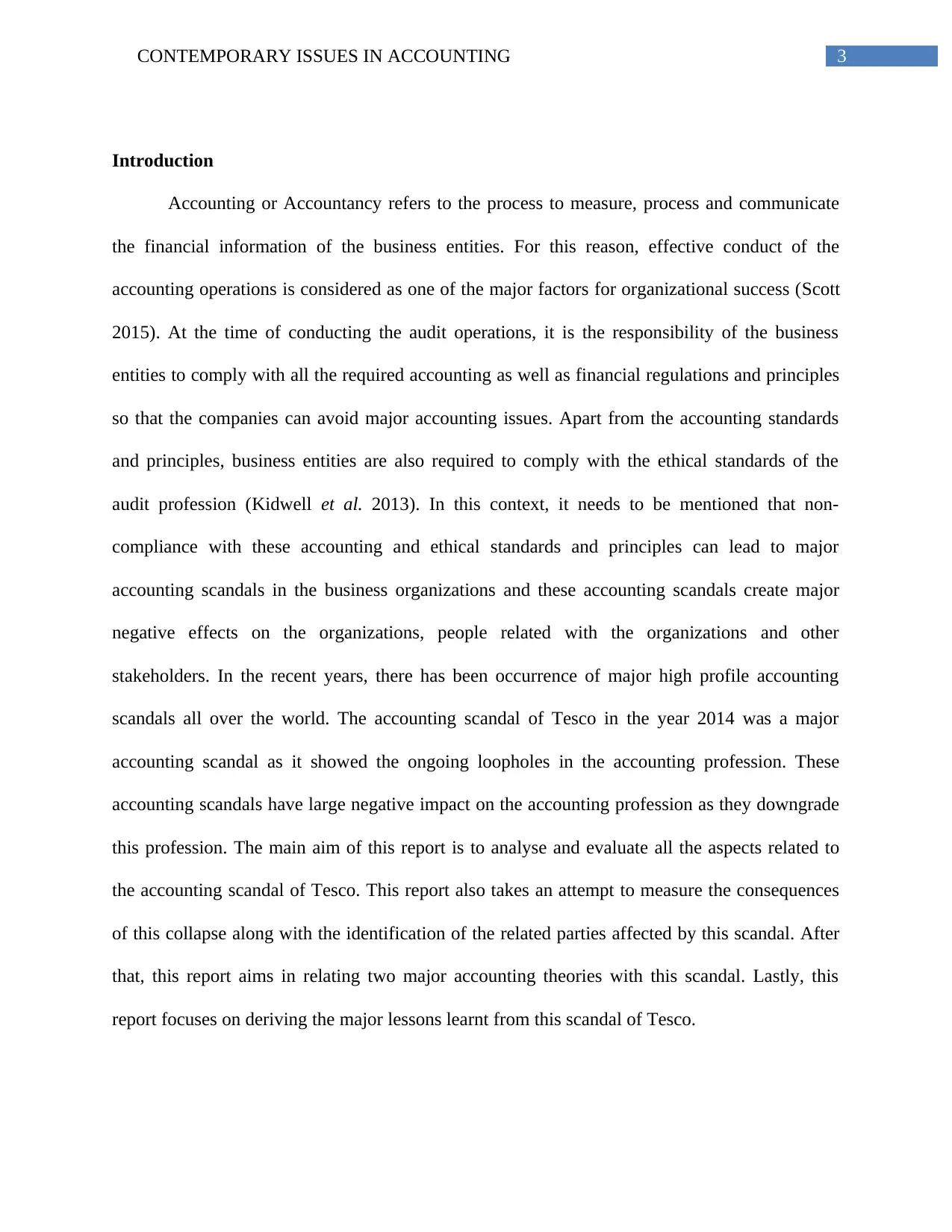
3CONTEMPORARY ISSUES IN ACCOUNTING
Introduction
Accounting or Accountancy refers to the process to measure, process and communicate
the financial information of the business entities. For this reason, effective conduct of the
accounting operations is considered as one of the major factors for organizational success (Scott
2015). At the time of conducting the audit operations, it is the responsibility of the business
entities to comply with all the required accounting as well as financial regulations and principles
so that the companies can avoid major accounting issues. Apart from the accounting standards
and principles, business entities are also required to comply with the ethical standards of the
audit profession (Kidwell et al. 2013). In this context, it needs to be mentioned that non-
compliance with these accounting and ethical standards and principles can lead to major
accounting scandals in the business organizations and these accounting scandals create major
negative effects on the organizations, people related with the organizations and other
stakeholders. In the recent years, there has been occurrence of major high profile accounting
scandals all over the world. The accounting scandal of Tesco in the year 2014 was a major
accounting scandal as it showed the ongoing loopholes in the accounting profession. These
accounting scandals have large negative impact on the accounting profession as they downgrade
this profession. The main aim of this report is to analyse and evaluate all the aspects related to
the accounting scandal of Tesco. This report also takes an attempt to measure the consequences
of this collapse along with the identification of the related parties affected by this scandal. After
that, this report aims in relating two major accounting theories with this scandal. Lastly, this
report focuses on deriving the major lessons learnt from this scandal of Tesco.
Introduction
Accounting or Accountancy refers to the process to measure, process and communicate
the financial information of the business entities. For this reason, effective conduct of the
accounting operations is considered as one of the major factors for organizational success (Scott
2015). At the time of conducting the audit operations, it is the responsibility of the business
entities to comply with all the required accounting as well as financial regulations and principles
so that the companies can avoid major accounting issues. Apart from the accounting standards
and principles, business entities are also required to comply with the ethical standards of the
audit profession (Kidwell et al. 2013). In this context, it needs to be mentioned that non-
compliance with these accounting and ethical standards and principles can lead to major
accounting scandals in the business organizations and these accounting scandals create major
negative effects on the organizations, people related with the organizations and other
stakeholders. In the recent years, there has been occurrence of major high profile accounting
scandals all over the world. The accounting scandal of Tesco in the year 2014 was a major
accounting scandal as it showed the ongoing loopholes in the accounting profession. These
accounting scandals have large negative impact on the accounting profession as they downgrade
this profession. The main aim of this report is to analyse and evaluate all the aspects related to
the accounting scandal of Tesco. This report also takes an attempt to measure the consequences
of this collapse along with the identification of the related parties affected by this scandal. After
that, this report aims in relating two major accounting theories with this scandal. Lastly, this
report focuses on deriving the major lessons learnt from this scandal of Tesco.
Paraphrase This Document
Need a fresh take? Get an instant paraphrase of this document with our AI Paraphraser
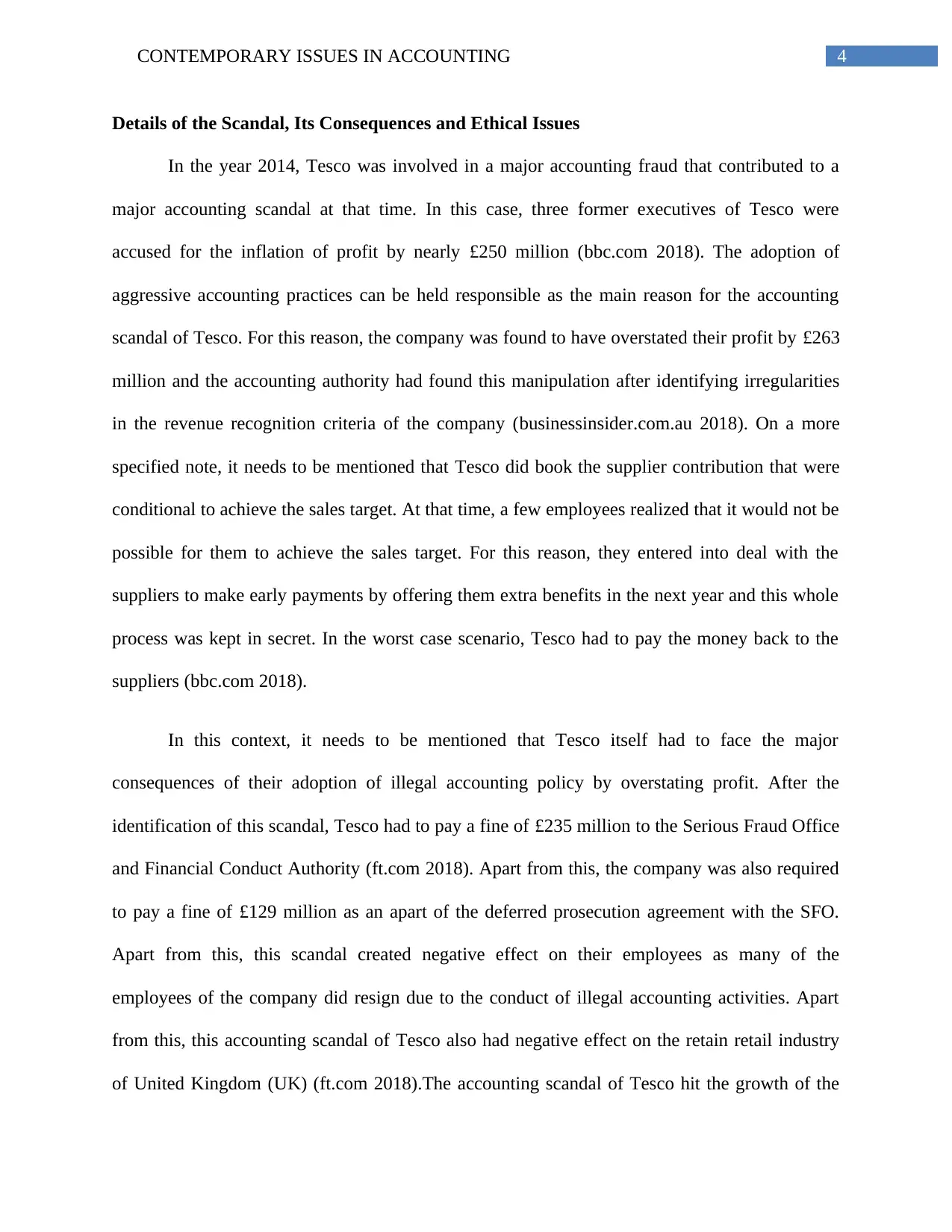
4CONTEMPORARY ISSUES IN ACCOUNTING
Details of the Scandal, Its Consequences and Ethical Issues
In the year 2014, Tesco was involved in a major accounting fraud that contributed to a
major accounting scandal at that time. In this case, three former executives of Tesco were
accused for the inflation of profit by nearly £250 million (bbc.com 2018). The adoption of
aggressive accounting practices can be held responsible as the main reason for the accounting
scandal of Tesco. For this reason, the company was found to have overstated their profit by £263
million and the accounting authority had found this manipulation after identifying irregularities
in the revenue recognition criteria of the company (businessinsider.com.au 2018). On a more
specified note, it needs to be mentioned that Tesco did book the supplier contribution that were
conditional to achieve the sales target. At that time, a few employees realized that it would not be
possible for them to achieve the sales target. For this reason, they entered into deal with the
suppliers to make early payments by offering them extra benefits in the next year and this whole
process was kept in secret. In the worst case scenario, Tesco had to pay the money back to the
suppliers (bbc.com 2018).
In this context, it needs to be mentioned that Tesco itself had to face the major
consequences of their adoption of illegal accounting policy by overstating profit. After the
identification of this scandal, Tesco had to pay a fine of £235 million to the Serious Fraud Office
and Financial Conduct Authority (ft.com 2018). Apart from this, the company was also required
to pay a fine of £129 million as an apart of the deferred prosecution agreement with the SFO.
Apart from this, this scandal created negative effect on their employees as many of the
employees of the company did resign due to the conduct of illegal accounting activities. Apart
from this, this accounting scandal of Tesco also had negative effect on the retain retail industry
of United Kingdom (UK) (ft.com 2018).The accounting scandal of Tesco hit the growth of the
Details of the Scandal, Its Consequences and Ethical Issues
In the year 2014, Tesco was involved in a major accounting fraud that contributed to a
major accounting scandal at that time. In this case, three former executives of Tesco were
accused for the inflation of profit by nearly £250 million (bbc.com 2018). The adoption of
aggressive accounting practices can be held responsible as the main reason for the accounting
scandal of Tesco. For this reason, the company was found to have overstated their profit by £263
million and the accounting authority had found this manipulation after identifying irregularities
in the revenue recognition criteria of the company (businessinsider.com.au 2018). On a more
specified note, it needs to be mentioned that Tesco did book the supplier contribution that were
conditional to achieve the sales target. At that time, a few employees realized that it would not be
possible for them to achieve the sales target. For this reason, they entered into deal with the
suppliers to make early payments by offering them extra benefits in the next year and this whole
process was kept in secret. In the worst case scenario, Tesco had to pay the money back to the
suppliers (bbc.com 2018).
In this context, it needs to be mentioned that Tesco itself had to face the major
consequences of their adoption of illegal accounting policy by overstating profit. After the
identification of this scandal, Tesco had to pay a fine of £235 million to the Serious Fraud Office
and Financial Conduct Authority (ft.com 2018). Apart from this, the company was also required
to pay a fine of £129 million as an apart of the deferred prosecution agreement with the SFO.
Apart from this, this scandal created negative effect on their employees as many of the
employees of the company did resign due to the conduct of illegal accounting activities. Apart
from this, this accounting scandal of Tesco also had negative effect on the retain retail industry
of United Kingdom (UK) (ft.com 2018).The accounting scandal of Tesco hit the growth of the
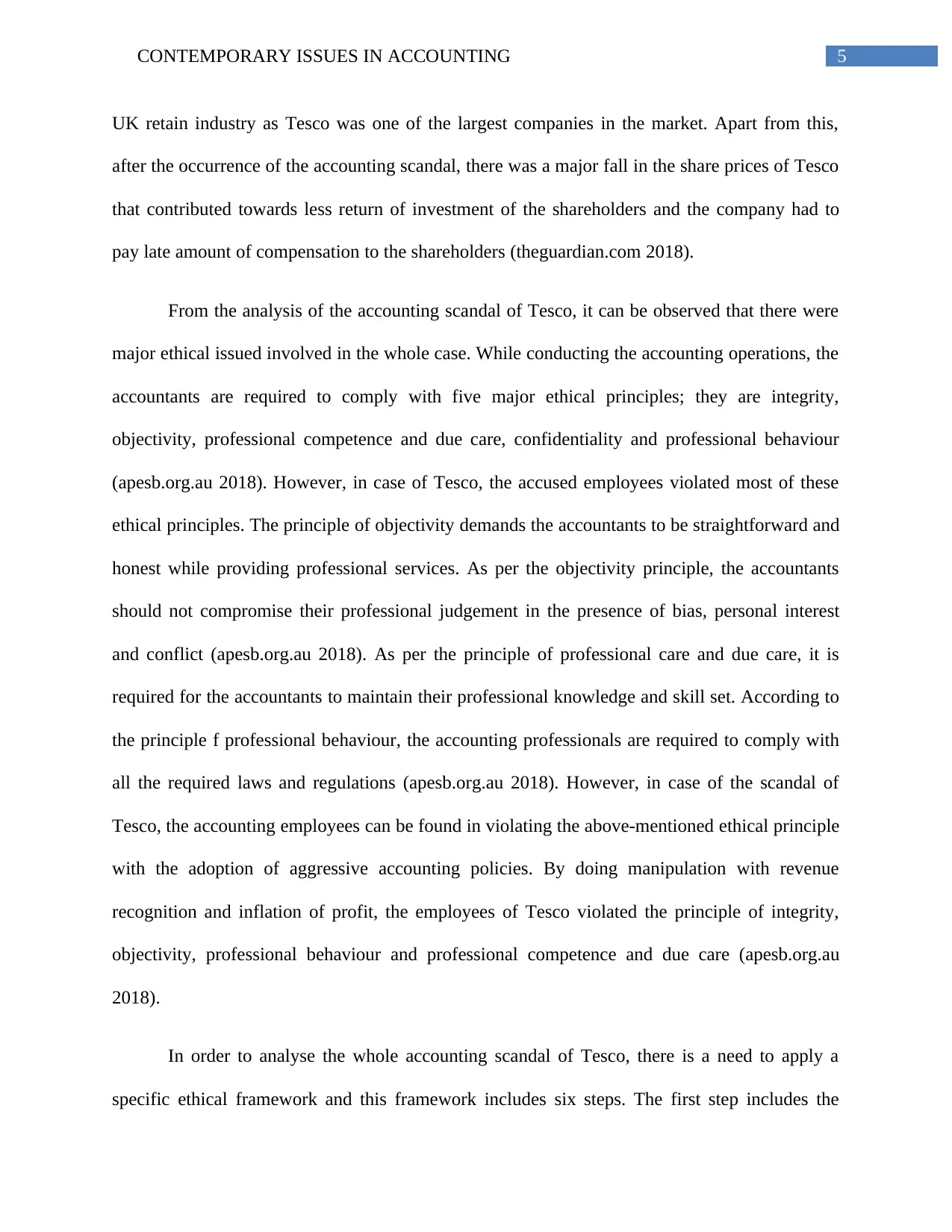
5CONTEMPORARY ISSUES IN ACCOUNTING
UK retain industry as Tesco was one of the largest companies in the market. Apart from this,
after the occurrence of the accounting scandal, there was a major fall in the share prices of Tesco
that contributed towards less return of investment of the shareholders and the company had to
pay late amount of compensation to the shareholders (theguardian.com 2018).
From the analysis of the accounting scandal of Tesco, it can be observed that there were
major ethical issued involved in the whole case. While conducting the accounting operations, the
accountants are required to comply with five major ethical principles; they are integrity,
objectivity, professional competence and due care, confidentiality and professional behaviour
(apesb.org.au 2018). However, in case of Tesco, the accused employees violated most of these
ethical principles. The principle of objectivity demands the accountants to be straightforward and
honest while providing professional services. As per the objectivity principle, the accountants
should not compromise their professional judgement in the presence of bias, personal interest
and conflict (apesb.org.au 2018). As per the principle of professional care and due care, it is
required for the accountants to maintain their professional knowledge and skill set. According to
the principle f professional behaviour, the accounting professionals are required to comply with
all the required laws and regulations (apesb.org.au 2018). However, in case of the scandal of
Tesco, the accounting employees can be found in violating the above-mentioned ethical principle
with the adoption of aggressive accounting policies. By doing manipulation with revenue
recognition and inflation of profit, the employees of Tesco violated the principle of integrity,
objectivity, professional behaviour and professional competence and due care (apesb.org.au
2018).
In order to analyse the whole accounting scandal of Tesco, there is a need to apply a
specific ethical framework and this framework includes six steps. The first step includes the
UK retain industry as Tesco was one of the largest companies in the market. Apart from this,
after the occurrence of the accounting scandal, there was a major fall in the share prices of Tesco
that contributed towards less return of investment of the shareholders and the company had to
pay late amount of compensation to the shareholders (theguardian.com 2018).
From the analysis of the accounting scandal of Tesco, it can be observed that there were
major ethical issued involved in the whole case. While conducting the accounting operations, the
accountants are required to comply with five major ethical principles; they are integrity,
objectivity, professional competence and due care, confidentiality and professional behaviour
(apesb.org.au 2018). However, in case of Tesco, the accused employees violated most of these
ethical principles. The principle of objectivity demands the accountants to be straightforward and
honest while providing professional services. As per the objectivity principle, the accountants
should not compromise their professional judgement in the presence of bias, personal interest
and conflict (apesb.org.au 2018). As per the principle of professional care and due care, it is
required for the accountants to maintain their professional knowledge and skill set. According to
the principle f professional behaviour, the accounting professionals are required to comply with
all the required laws and regulations (apesb.org.au 2018). However, in case of the scandal of
Tesco, the accounting employees can be found in violating the above-mentioned ethical principle
with the adoption of aggressive accounting policies. By doing manipulation with revenue
recognition and inflation of profit, the employees of Tesco violated the principle of integrity,
objectivity, professional behaviour and professional competence and due care (apesb.org.au
2018).
In order to analyse the whole accounting scandal of Tesco, there is a need to apply a
specific ethical framework and this framework includes six steps. The first step includes the
⊘ This is a preview!⊘
Do you want full access?
Subscribe today to unlock all pages.

Trusted by 1+ million students worldwide
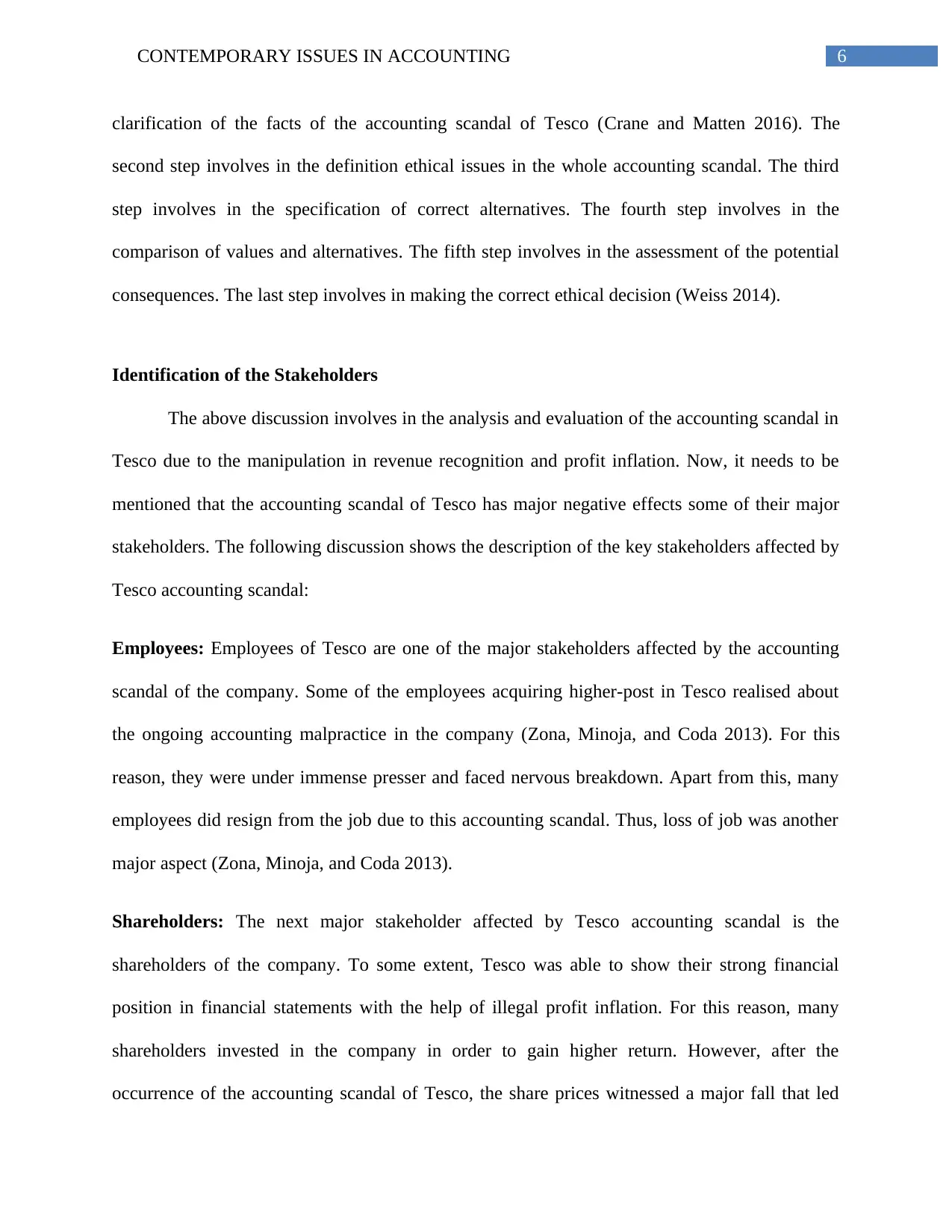
6CONTEMPORARY ISSUES IN ACCOUNTING
clarification of the facts of the accounting scandal of Tesco (Crane and Matten 2016). The
second step involves in the definition ethical issues in the whole accounting scandal. The third
step involves in the specification of correct alternatives. The fourth step involves in the
comparison of values and alternatives. The fifth step involves in the assessment of the potential
consequences. The last step involves in making the correct ethical decision (Weiss 2014).
Identification of the Stakeholders
The above discussion involves in the analysis and evaluation of the accounting scandal in
Tesco due to the manipulation in revenue recognition and profit inflation. Now, it needs to be
mentioned that the accounting scandal of Tesco has major negative effects some of their major
stakeholders. The following discussion shows the description of the key stakeholders affected by
Tesco accounting scandal:
Employees: Employees of Tesco are one of the major stakeholders affected by the accounting
scandal of the company. Some of the employees acquiring higher-post in Tesco realised about
the ongoing accounting malpractice in the company (Zona, Minoja, and Coda 2013). For this
reason, they were under immense presser and faced nervous breakdown. Apart from this, many
employees did resign from the job due to this accounting scandal. Thus, loss of job was another
major aspect (Zona, Minoja, and Coda 2013).
Shareholders: The next major stakeholder affected by Tesco accounting scandal is the
shareholders of the company. To some extent, Tesco was able to show their strong financial
position in financial statements with the help of illegal profit inflation. For this reason, many
shareholders invested in the company in order to gain higher return. However, after the
occurrence of the accounting scandal of Tesco, the share prices witnessed a major fall that led
clarification of the facts of the accounting scandal of Tesco (Crane and Matten 2016). The
second step involves in the definition ethical issues in the whole accounting scandal. The third
step involves in the specification of correct alternatives. The fourth step involves in the
comparison of values and alternatives. The fifth step involves in the assessment of the potential
consequences. The last step involves in making the correct ethical decision (Weiss 2014).
Identification of the Stakeholders
The above discussion involves in the analysis and evaluation of the accounting scandal in
Tesco due to the manipulation in revenue recognition and profit inflation. Now, it needs to be
mentioned that the accounting scandal of Tesco has major negative effects some of their major
stakeholders. The following discussion shows the description of the key stakeholders affected by
Tesco accounting scandal:
Employees: Employees of Tesco are one of the major stakeholders affected by the accounting
scandal of the company. Some of the employees acquiring higher-post in Tesco realised about
the ongoing accounting malpractice in the company (Zona, Minoja, and Coda 2013). For this
reason, they were under immense presser and faced nervous breakdown. Apart from this, many
employees did resign from the job due to this accounting scandal. Thus, loss of job was another
major aspect (Zona, Minoja, and Coda 2013).
Shareholders: The next major stakeholder affected by Tesco accounting scandal is the
shareholders of the company. To some extent, Tesco was able to show their strong financial
position in financial statements with the help of illegal profit inflation. For this reason, many
shareholders invested in the company in order to gain higher return. However, after the
occurrence of the accounting scandal of Tesco, the share prices witnessed a major fall that led
Paraphrase This Document
Need a fresh take? Get an instant paraphrase of this document with our AI Paraphraser
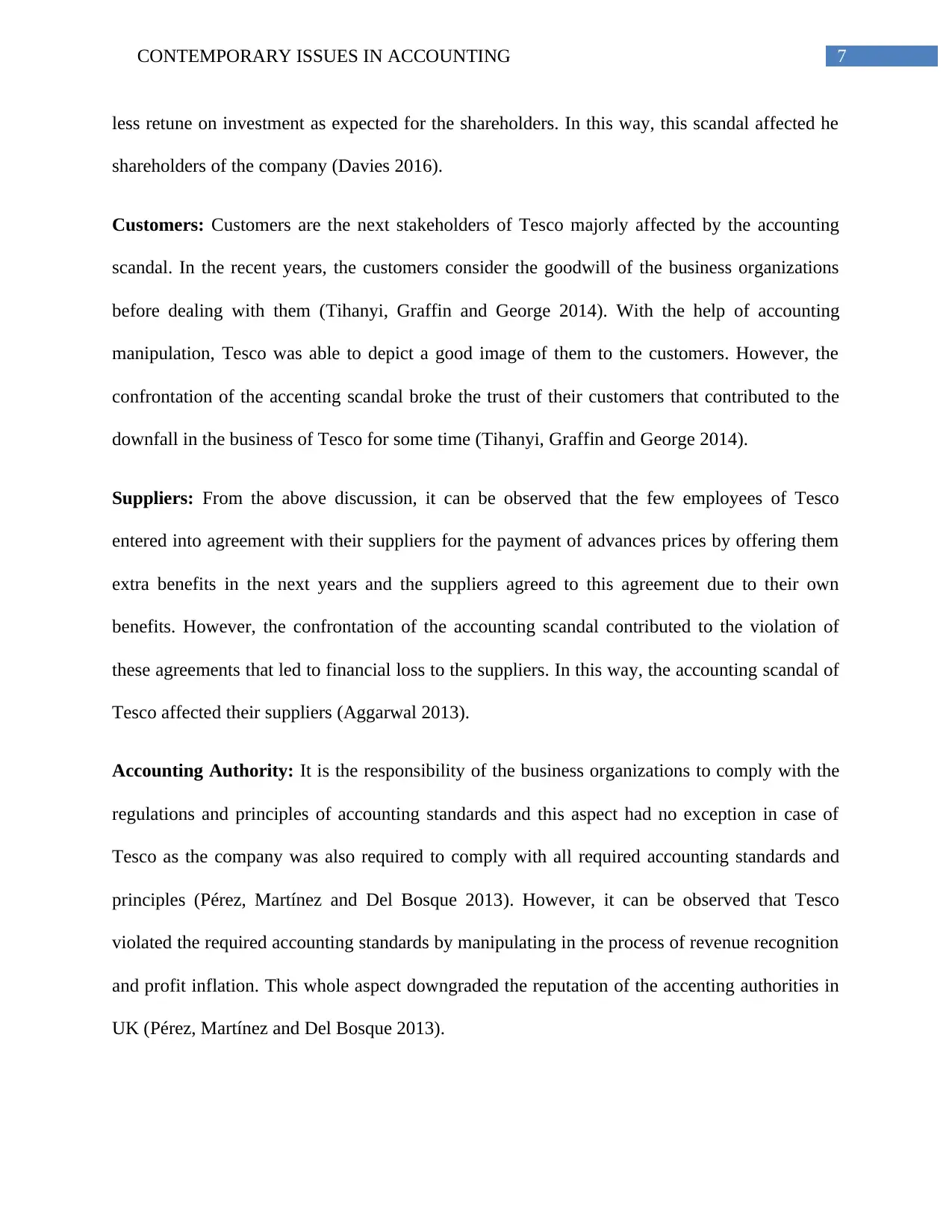
7CONTEMPORARY ISSUES IN ACCOUNTING
less retune on investment as expected for the shareholders. In this way, this scandal affected he
shareholders of the company (Davies 2016).
Customers: Customers are the next stakeholders of Tesco majorly affected by the accounting
scandal. In the recent years, the customers consider the goodwill of the business organizations
before dealing with them (Tihanyi, Graffin and George 2014). With the help of accounting
manipulation, Tesco was able to depict a good image of them to the customers. However, the
confrontation of the accenting scandal broke the trust of their customers that contributed to the
downfall in the business of Tesco for some time (Tihanyi, Graffin and George 2014).
Suppliers: From the above discussion, it can be observed that the few employees of Tesco
entered into agreement with their suppliers for the payment of advances prices by offering them
extra benefits in the next years and the suppliers agreed to this agreement due to their own
benefits. However, the confrontation of the accounting scandal contributed to the violation of
these agreements that led to financial loss to the suppliers. In this way, the accounting scandal of
Tesco affected their suppliers (Aggarwal 2013).
Accounting Authority: It is the responsibility of the business organizations to comply with the
regulations and principles of accounting standards and this aspect had no exception in case of
Tesco as the company was also required to comply with all required accounting standards and
principles (Pérez, Martínez and Del Bosque 2013). However, it can be observed that Tesco
violated the required accounting standards by manipulating in the process of revenue recognition
and profit inflation. This whole aspect downgraded the reputation of the accenting authorities in
UK (Pérez, Martínez and Del Bosque 2013).
less retune on investment as expected for the shareholders. In this way, this scandal affected he
shareholders of the company (Davies 2016).
Customers: Customers are the next stakeholders of Tesco majorly affected by the accounting
scandal. In the recent years, the customers consider the goodwill of the business organizations
before dealing with them (Tihanyi, Graffin and George 2014). With the help of accounting
manipulation, Tesco was able to depict a good image of them to the customers. However, the
confrontation of the accenting scandal broke the trust of their customers that contributed to the
downfall in the business of Tesco for some time (Tihanyi, Graffin and George 2014).
Suppliers: From the above discussion, it can be observed that the few employees of Tesco
entered into agreement with their suppliers for the payment of advances prices by offering them
extra benefits in the next years and the suppliers agreed to this agreement due to their own
benefits. However, the confrontation of the accounting scandal contributed to the violation of
these agreements that led to financial loss to the suppliers. In this way, the accounting scandal of
Tesco affected their suppliers (Aggarwal 2013).
Accounting Authority: It is the responsibility of the business organizations to comply with the
regulations and principles of accounting standards and this aspect had no exception in case of
Tesco as the company was also required to comply with all required accounting standards and
principles (Pérez, Martínez and Del Bosque 2013). However, it can be observed that Tesco
violated the required accounting standards by manipulating in the process of revenue recognition
and profit inflation. This whole aspect downgraded the reputation of the accenting authorities in
UK (Pérez, Martínez and Del Bosque 2013).
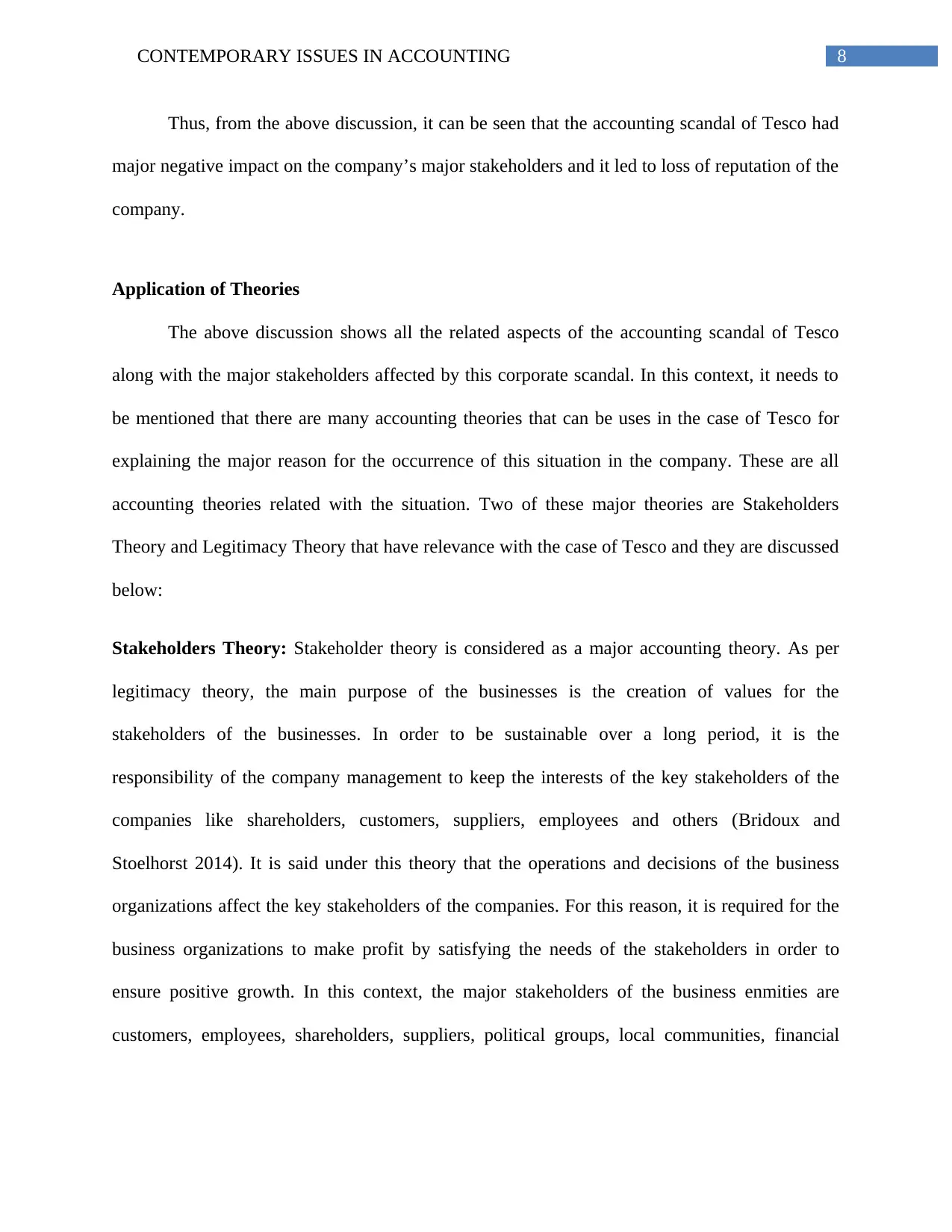
8CONTEMPORARY ISSUES IN ACCOUNTING
Thus, from the above discussion, it can be seen that the accounting scandal of Tesco had
major negative impact on the company’s major stakeholders and it led to loss of reputation of the
company.
Application of Theories
The above discussion shows all the related aspects of the accounting scandal of Tesco
along with the major stakeholders affected by this corporate scandal. In this context, it needs to
be mentioned that there are many accounting theories that can be uses in the case of Tesco for
explaining the major reason for the occurrence of this situation in the company. These are all
accounting theories related with the situation. Two of these major theories are Stakeholders
Theory and Legitimacy Theory that have relevance with the case of Tesco and they are discussed
below:
Stakeholders Theory: Stakeholder theory is considered as a major accounting theory. As per
legitimacy theory, the main purpose of the businesses is the creation of values for the
stakeholders of the businesses. In order to be sustainable over a long period, it is the
responsibility of the company management to keep the interests of the key stakeholders of the
companies like shareholders, customers, suppliers, employees and others (Bridoux and
Stoelhorst 2014). It is said under this theory that the operations and decisions of the business
organizations affect the key stakeholders of the companies. For this reason, it is required for the
business organizations to make profit by satisfying the needs of the stakeholders in order to
ensure positive growth. In this context, the major stakeholders of the business enmities are
customers, employees, shareholders, suppliers, political groups, local communities, financial
Thus, from the above discussion, it can be seen that the accounting scandal of Tesco had
major negative impact on the company’s major stakeholders and it led to loss of reputation of the
company.
Application of Theories
The above discussion shows all the related aspects of the accounting scandal of Tesco
along with the major stakeholders affected by this corporate scandal. In this context, it needs to
be mentioned that there are many accounting theories that can be uses in the case of Tesco for
explaining the major reason for the occurrence of this situation in the company. These are all
accounting theories related with the situation. Two of these major theories are Stakeholders
Theory and Legitimacy Theory that have relevance with the case of Tesco and they are discussed
below:
Stakeholders Theory: Stakeholder theory is considered as a major accounting theory. As per
legitimacy theory, the main purpose of the businesses is the creation of values for the
stakeholders of the businesses. In order to be sustainable over a long period, it is the
responsibility of the company management to keep the interests of the key stakeholders of the
companies like shareholders, customers, suppliers, employees and others (Bridoux and
Stoelhorst 2014). It is said under this theory that the operations and decisions of the business
organizations affect the key stakeholders of the companies. For this reason, it is required for the
business organizations to make profit by satisfying the needs of the stakeholders in order to
ensure positive growth. In this context, the major stakeholders of the business enmities are
customers, employees, shareholders, suppliers, political groups, local communities, financial
⊘ This is a preview!⊘
Do you want full access?
Subscribe today to unlock all pages.

Trusted by 1+ million students worldwide
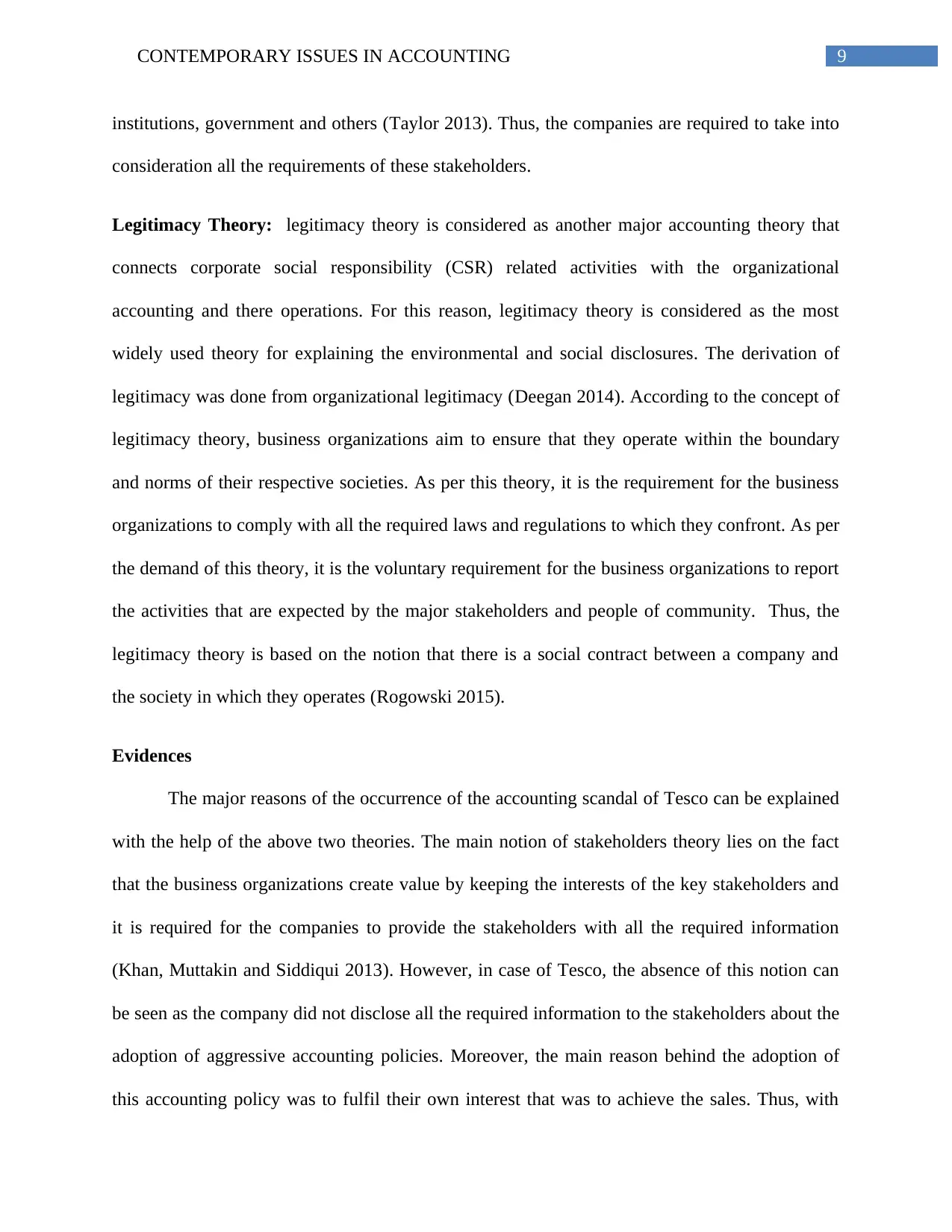
9CONTEMPORARY ISSUES IN ACCOUNTING
institutions, government and others (Taylor 2013). Thus, the companies are required to take into
consideration all the requirements of these stakeholders.
Legitimacy Theory: legitimacy theory is considered as another major accounting theory that
connects corporate social responsibility (CSR) related activities with the organizational
accounting and there operations. For this reason, legitimacy theory is considered as the most
widely used theory for explaining the environmental and social disclosures. The derivation of
legitimacy was done from organizational legitimacy (Deegan 2014). According to the concept of
legitimacy theory, business organizations aim to ensure that they operate within the boundary
and norms of their respective societies. As per this theory, it is the requirement for the business
organizations to comply with all the required laws and regulations to which they confront. As per
the demand of this theory, it is the voluntary requirement for the business organizations to report
the activities that are expected by the major stakeholders and people of community. Thus, the
legitimacy theory is based on the notion that there is a social contract between a company and
the society in which they operates (Rogowski 2015).
Evidences
The major reasons of the occurrence of the accounting scandal of Tesco can be explained
with the help of the above two theories. The main notion of stakeholders theory lies on the fact
that the business organizations create value by keeping the interests of the key stakeholders and
it is required for the companies to provide the stakeholders with all the required information
(Khan, Muttakin and Siddiqui 2013). However, in case of Tesco, the absence of this notion can
be seen as the company did not disclose all the required information to the stakeholders about the
adoption of aggressive accounting policies. Moreover, the main reason behind the adoption of
this accounting policy was to fulfil their own interest that was to achieve the sales. Thus, with
institutions, government and others (Taylor 2013). Thus, the companies are required to take into
consideration all the requirements of these stakeholders.
Legitimacy Theory: legitimacy theory is considered as another major accounting theory that
connects corporate social responsibility (CSR) related activities with the organizational
accounting and there operations. For this reason, legitimacy theory is considered as the most
widely used theory for explaining the environmental and social disclosures. The derivation of
legitimacy was done from organizational legitimacy (Deegan 2014). According to the concept of
legitimacy theory, business organizations aim to ensure that they operate within the boundary
and norms of their respective societies. As per this theory, it is the requirement for the business
organizations to comply with all the required laws and regulations to which they confront. As per
the demand of this theory, it is the voluntary requirement for the business organizations to report
the activities that are expected by the major stakeholders and people of community. Thus, the
legitimacy theory is based on the notion that there is a social contract between a company and
the society in which they operates (Rogowski 2015).
Evidences
The major reasons of the occurrence of the accounting scandal of Tesco can be explained
with the help of the above two theories. The main notion of stakeholders theory lies on the fact
that the business organizations create value by keeping the interests of the key stakeholders and
it is required for the companies to provide the stakeholders with all the required information
(Khan, Muttakin and Siddiqui 2013). However, in case of Tesco, the absence of this notion can
be seen as the company did not disclose all the required information to the stakeholders about the
adoption of aggressive accounting policies. Moreover, the main reason behind the adoption of
this accounting policy was to fulfil their own interest that was to achieve the sales. Thus, with
Paraphrase This Document
Need a fresh take? Get an instant paraphrase of this document with our AI Paraphraser
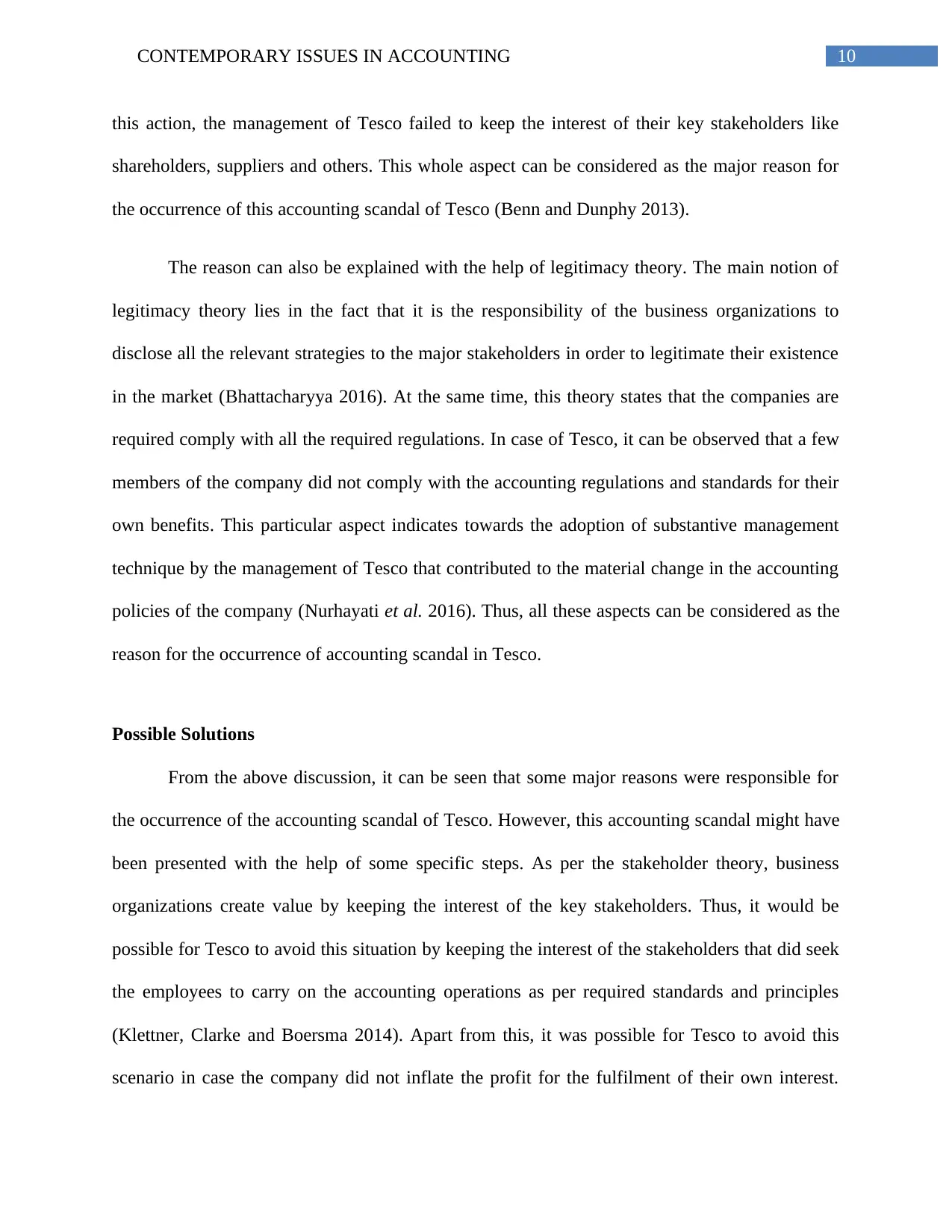
10CONTEMPORARY ISSUES IN ACCOUNTING
this action, the management of Tesco failed to keep the interest of their key stakeholders like
shareholders, suppliers and others. This whole aspect can be considered as the major reason for
the occurrence of this accounting scandal of Tesco (Benn and Dunphy 2013).
The reason can also be explained with the help of legitimacy theory. The main notion of
legitimacy theory lies in the fact that it is the responsibility of the business organizations to
disclose all the relevant strategies to the major stakeholders in order to legitimate their existence
in the market (Bhattacharyya 2016). At the same time, this theory states that the companies are
required comply with all the required regulations. In case of Tesco, it can be observed that a few
members of the company did not comply with the accounting regulations and standards for their
own benefits. This particular aspect indicates towards the adoption of substantive management
technique by the management of Tesco that contributed to the material change in the accounting
policies of the company (Nurhayati et al. 2016). Thus, all these aspects can be considered as the
reason for the occurrence of accounting scandal in Tesco.
Possible Solutions
From the above discussion, it can be seen that some major reasons were responsible for
the occurrence of the accounting scandal of Tesco. However, this accounting scandal might have
been presented with the help of some specific steps. As per the stakeholder theory, business
organizations create value by keeping the interest of the key stakeholders. Thus, it would be
possible for Tesco to avoid this situation by keeping the interest of the stakeholders that did seek
the employees to carry on the accounting operations as per required standards and principles
(Klettner, Clarke and Boersma 2014). Apart from this, it was possible for Tesco to avoid this
scenario in case the company did not inflate the profit for the fulfilment of their own interest.
this action, the management of Tesco failed to keep the interest of their key stakeholders like
shareholders, suppliers and others. This whole aspect can be considered as the major reason for
the occurrence of this accounting scandal of Tesco (Benn and Dunphy 2013).
The reason can also be explained with the help of legitimacy theory. The main notion of
legitimacy theory lies in the fact that it is the responsibility of the business organizations to
disclose all the relevant strategies to the major stakeholders in order to legitimate their existence
in the market (Bhattacharyya 2016). At the same time, this theory states that the companies are
required comply with all the required regulations. In case of Tesco, it can be observed that a few
members of the company did not comply with the accounting regulations and standards for their
own benefits. This particular aspect indicates towards the adoption of substantive management
technique by the management of Tesco that contributed to the material change in the accounting
policies of the company (Nurhayati et al. 2016). Thus, all these aspects can be considered as the
reason for the occurrence of accounting scandal in Tesco.
Possible Solutions
From the above discussion, it can be seen that some major reasons were responsible for
the occurrence of the accounting scandal of Tesco. However, this accounting scandal might have
been presented with the help of some specific steps. As per the stakeholder theory, business
organizations create value by keeping the interest of the key stakeholders. Thus, it would be
possible for Tesco to avoid this situation by keeping the interest of the stakeholders that did seek
the employees to carry on the accounting operations as per required standards and principles
(Klettner, Clarke and Boersma 2014). Apart from this, it was possible for Tesco to avoid this
scenario in case the company did not inflate the profit for the fulfilment of their own interest.
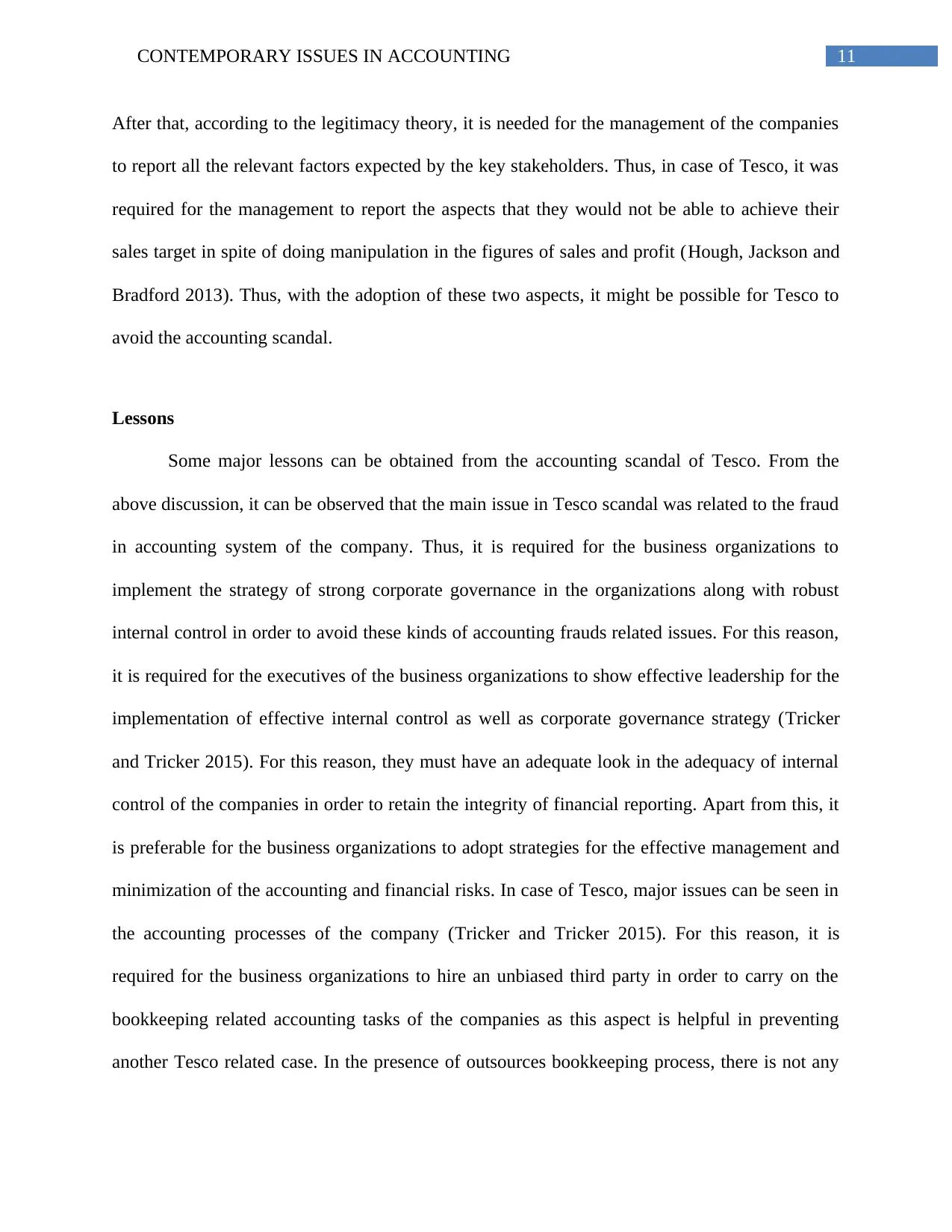
11CONTEMPORARY ISSUES IN ACCOUNTING
After that, according to the legitimacy theory, it is needed for the management of the companies
to report all the relevant factors expected by the key stakeholders. Thus, in case of Tesco, it was
required for the management to report the aspects that they would not be able to achieve their
sales target in spite of doing manipulation in the figures of sales and profit (Hough, Jackson and
Bradford 2013). Thus, with the adoption of these two aspects, it might be possible for Tesco to
avoid the accounting scandal.
Lessons
Some major lessons can be obtained from the accounting scandal of Tesco. From the
above discussion, it can be observed that the main issue in Tesco scandal was related to the fraud
in accounting system of the company. Thus, it is required for the business organizations to
implement the strategy of strong corporate governance in the organizations along with robust
internal control in order to avoid these kinds of accounting frauds related issues. For this reason,
it is required for the executives of the business organizations to show effective leadership for the
implementation of effective internal control as well as corporate governance strategy (Tricker
and Tricker 2015). For this reason, they must have an adequate look in the adequacy of internal
control of the companies in order to retain the integrity of financial reporting. Apart from this, it
is preferable for the business organizations to adopt strategies for the effective management and
minimization of the accounting and financial risks. In case of Tesco, major issues can be seen in
the accounting processes of the company (Tricker and Tricker 2015). For this reason, it is
required for the business organizations to hire an unbiased third party in order to carry on the
bookkeeping related accounting tasks of the companies as this aspect is helpful in preventing
another Tesco related case. In the presence of outsources bookkeeping process, there is not any
After that, according to the legitimacy theory, it is needed for the management of the companies
to report all the relevant factors expected by the key stakeholders. Thus, in case of Tesco, it was
required for the management to report the aspects that they would not be able to achieve their
sales target in spite of doing manipulation in the figures of sales and profit (Hough, Jackson and
Bradford 2013). Thus, with the adoption of these two aspects, it might be possible for Tesco to
avoid the accounting scandal.
Lessons
Some major lessons can be obtained from the accounting scandal of Tesco. From the
above discussion, it can be observed that the main issue in Tesco scandal was related to the fraud
in accounting system of the company. Thus, it is required for the business organizations to
implement the strategy of strong corporate governance in the organizations along with robust
internal control in order to avoid these kinds of accounting frauds related issues. For this reason,
it is required for the executives of the business organizations to show effective leadership for the
implementation of effective internal control as well as corporate governance strategy (Tricker
and Tricker 2015). For this reason, they must have an adequate look in the adequacy of internal
control of the companies in order to retain the integrity of financial reporting. Apart from this, it
is preferable for the business organizations to adopt strategies for the effective management and
minimization of the accounting and financial risks. In case of Tesco, major issues can be seen in
the accounting processes of the company (Tricker and Tricker 2015). For this reason, it is
required for the business organizations to hire an unbiased third party in order to carry on the
bookkeeping related accounting tasks of the companies as this aspect is helpful in preventing
another Tesco related case. In the presence of outsources bookkeeping process, there is not any
⊘ This is a preview!⊘
Do you want full access?
Subscribe today to unlock all pages.

Trusted by 1+ million students worldwide
1 out of 18
Related Documents
Your All-in-One AI-Powered Toolkit for Academic Success.
+13062052269
info@desklib.com
Available 24*7 on WhatsApp / Email
![[object Object]](/_next/static/media/star-bottom.7253800d.svg)
Unlock your academic potential
Copyright © 2020–2025 A2Z Services. All Rights Reserved. Developed and managed by ZUCOL.





